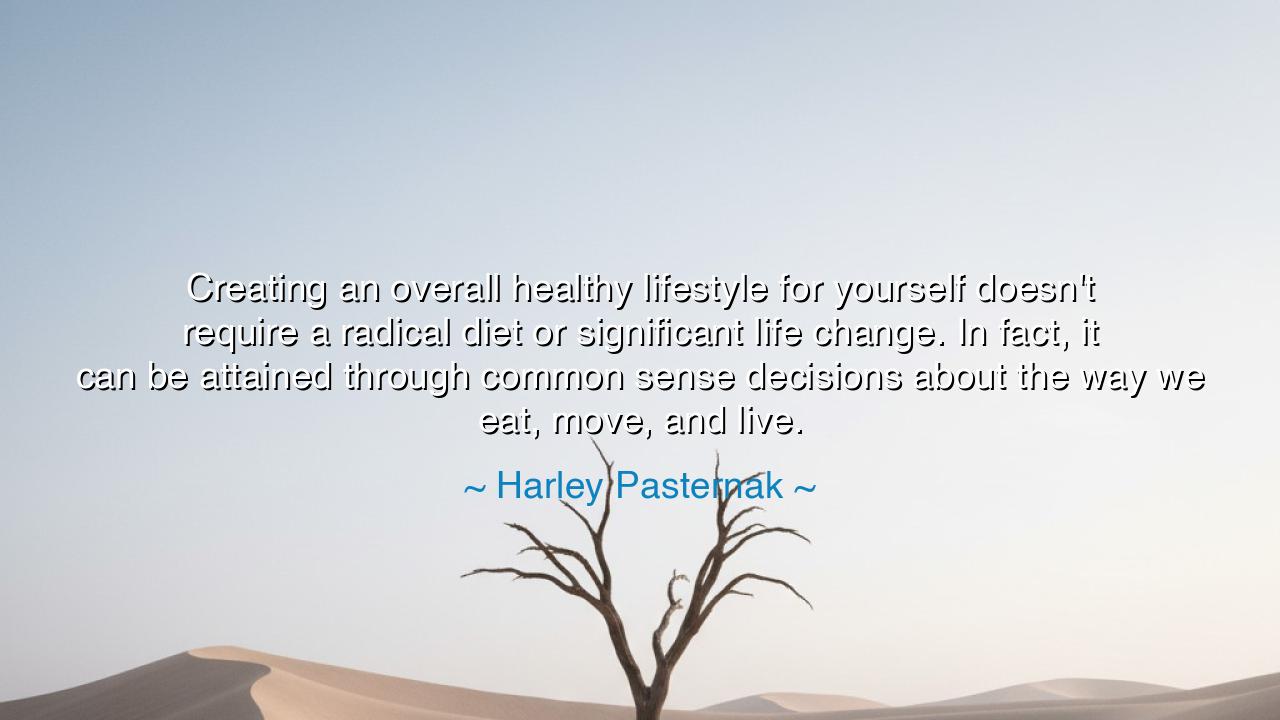
Creating an overall healthy lifestyle for yourself doesn't
Creating an overall healthy lifestyle for yourself doesn't require a radical diet or significant life change. In fact, it can be attained through common sense decisions about the way we eat, move, and live.






"Creating an overall healthy lifestyle for yourself doesn't require a radical diet or significant life change. In fact, it can be attained through common sense decisions about the way we eat, move, and live." These words, spoken by Harley Pasternak, offer us a profound yet simple truth that has echoed through the corridors of human history: health, vitality, and well-being are not achieved through drastic measures, but through balance, moderation, and wisdom in the choices we make daily. The pursuit of a healthy lifestyle is not a journey of extremes, but of steady, mindful decisions that shape the way we live, eat, and move.
In the ancient world, the great philosophers like Aristotle and Socrates understood the significance of living a life in alignment with nature's rhythms. They taught that virtue and happiness lie not in excess or deprivation, but in the golden mean—the balance between too much and too little. To be healthy, to be virtuous, was to find harmony in one’s actions and choices. Pasternak’s words reflect this ancient wisdom: the path to health is not found through radical changes, but through the daily practice of making common-sense decisions that honor the body and mind. To nourish oneself properly, to move with purpose, and to live with intention—these are the pillars of well-being.
Consider, for instance, the way the ancient Greeks approached their bodies. They placed great importance on physical fitness, but their approach was not one of relentless training or extreme deprivation. Hippocrates, the father of medicine, famously said, "Let food be thy medicine, and let medicine be thy food." He advocated for a balanced approach to health, one that involved simple but nourishing foods and moderate physical activity. The Greeks understood that true strength comes not from excess, but from maintaining a steady, balanced approach to diet and movement. In the same way, Pasternak’s message to us is that health can be cultivated not through drastic change, but through the simple decisions we make every day to care for our bodies and minds.
The story of Marcus Aurelius, the philosopher-king of ancient Rome, serves as another example of how a balanced approach to life leads to health and inner peace. Marcus Aurelius was not only a ruler, but a deeply thoughtful man who understood that a life of moderation and reflection was key to his success. He would rise early each day, engage in exercise, and reflect on the choices that shaped his reign. His physical fitness was not an afterthought but a necessary part of his ability to lead with wisdom and strength. Marcus Aurelius’s example teaches us that a healthy lifestyle is about aligning body and mind through routine and common sense—not through radical, fleeting changes. Pasternak echoes this in his belief that health is cultivated through simple, consistent choices over time.
The lesson here is one of simplicity and consistency. The modern world often tempts us with extreme diets, high-intensity workout regimens, and quick fixes, promising immediate results. But the ancients knew that these fleeting approaches can never sustain true health. To live a life that honors the body and the soul requires a steadfast commitment to balance and moderation. Pasternak’s approach invites us to step away from extremes and instead focus on the small, yet impactful, decisions we make every day—whether it is the food we consume, the amount of movement we engage in, or the way we nourish our minds and spirits.
Take, for instance, the habits of ancient warriors. They did not live in excess, nor did they starve themselves. Their training was focused, their diets simple and effective, designed to keep them at their best for the battles they faced. Their strength came not from extremes but from consistency, from practicing their craft daily with purpose and intention. In much the same way, our health does not come from sudden, radical shifts in behavior, but from a steady commitment to living with purpose—making choices that support our physical, emotional, and mental well-being.
In practical terms, this means we must learn to listen to our bodies, to nourish them with wholesome foods, to move them regularly in ways that feel natural and joyful, and to cultivate a life of purpose and balance. Rather than seeking quick fixes or indulging in drastic transformations, let us make daily decisions that align with our higher purpose. Whether it’s a small step towards a healthier diet, a daily walk to keep the body active, or taking time to reflect and breathe, these small, consistent actions will build a life of lasting health and vitality.
Thus, Harley Pasternak’s message is timeless: that health is not a distant goal or a dramatic change, but a series of small, wise decisions made every day. By embracing balance, moderation, and common sense, we can create a lifestyle that nourishes the body, mind, and spirit. Let us learn from the ancients and from Pasternak’s wisdom, choosing the steady path of consistency and mindful living, knowing that this is the true way to build a life of health and well-being.






AAdministratorAdministrator
Welcome, honored guests. Please leave a comment, we will respond soon